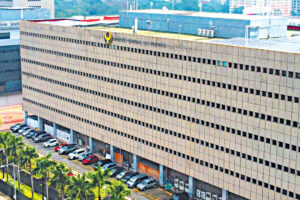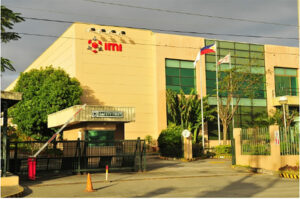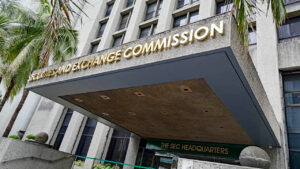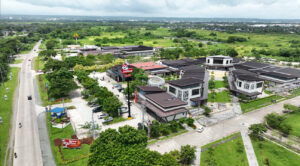Pope Francis: Servant-leader to the world
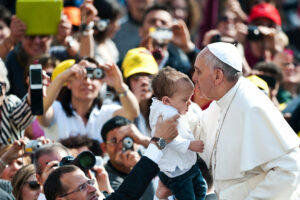
On Easter Sunday, April 20, Pope Francis blessed all from the central loggia of St. Peter’s Basilica — “Urbi et Orbi” (To the city [Rome] and to the world).
“On this day, I would like all of us to hope anew and to revive our trust in others, including those who are different than ourselves, or who come from distant lands, bringing unfamiliar customs, ways of life, and ideas! For all of us are children of God!,” he said.
Pope Francis did not himself deliver his speech, but he sat quietly in his wheelchair on the balcony as his prayers were read out to the multitude at St. Peter’s Square in Rome, and to the world.
“May the light of peace radiate throughout the Holy Land and the entire world… (Pray for) Israel, and for all the Israeli people and the Palestinian people. The growing climate of anti-Semitism throughout the world is worrisome. (Pray) for the people of Gaza… where the terrible conflict continues to cause death and destruction and to create a dramatic and deplorable humanitarian situation. I appeal to the warring parties: Call a ceasefire, release the hostages, and come to the aid of a starving people that aspires to a future of peace!
“Let us pray for the Christian communities in Lebanon and in Syria, presently experiencing a delicate transition in its history. They aspire to stability and to participation in the life of their respective nations;
“…for the people of Yemen, who are experiencing one of the world’s most serious and prolonged humanitarian crises because of war, and I invite all to find solutions through a constructive dialogue;
“…for Ukraine, devastated by war. I encourage all parties involved to pursue efforts aimed at achieving a just and lasting peace;
“…for the South Caucasus and pray that a final peace agreement between Armenia and Azerbaijan will soon be signed and implemented, and lead to long-awaited reconciliation in the region;
“…for harmony in the western Balkans and sustain political leaders in their efforts to allay tensions and crises, and, together with their partner countries in the region, to reject dangerous and destabilizing action;
“…for the African peoples who are victims of violence and conflict, especially in the Democratic Republic of Congo, in Sudan and South Sudan; for tensions in the Sahel, the Horn of Africa, and the Great Lakes region, as well as those Christians who in many places are not able freely to profess their faith;
“…for the people of Myanmar, plagued by long years of armed conflict, who, with courage and patience, are dealing with the aftermath of the devastating earthquake in Sagaing, which caused the death of thousands and great suffering for many.
“Men and women in our world, in their hunger for wealth and power, consume even their neighbors, their brothers and sisters,” he said. “How many wars have we seen! And in how many places, even today, are human dignity and freedom treated with contempt!
“I appeal to all those in positions of political responsibility in our world not to yield to the logic of fear, which only leads to isolation from others, but rather to use the resources available to help the needy, to fight hunger and to encourage initiatives that promote development. These are the ‘weapons’ of peace: weapons that build the future instead of sowing seeds of death!
“There can be no peace without freedom of religion, freedom of thought, freedom of expression, and respect for the views of others. May the principle of humanity never fail to be the hallmark of our daily actions… In this jubilee year, may Easter also be a fitting occasion for the liberation of prisoners of war and political prisoners!”
Pope Francis blessed not only the 1.406 billion Catholics worldwide, but all the world. “Buona Pasqua (Happy Easter)!”
On Easter Monday, April 21, Pope Francis passed away peacefully at 7:35 a.m. in his room at Casa Santa Marta, a Vatican guesthouse where he chose to live instead of the Apostolic Palace since his election as Pope in 2013. His health problems this year started in early February with an initial diagnosis of bronchitis, which over a month degenerated into respiratory tract infections and then bilateral pneumonia. Pope Francis suffered episodes of acute respiratory failure and early kidney failure. After five weeks, he left Rome’s Gemelli Hospital to recuperate at home.
The world was shocked to know of Pope Francis’ fatal stroke and passing when all thought he had hurdled his health challenges. Why, we watched him ride in the popemobile on Easter Sunday after the Urbi et Orbi blessing on the balcony of St. Peter’s Basilica, waving to the ecstatic crowd of 50,000 at St. Peter’s Square! We are so saddened by the loss of a great, well-loved servant-leader of the world. Pope Francis belonged to the world.
Pope Francis (born Jorge Mario Bergoglio; Dec. 17, 1936 — April 21, 2025; 88 years old) was the head of the Catholic Church and sovereign of the Vatican City State from 2013 until his death. He was the first Jesuit pope, the first Latin American, the first from the Americas, the first from the Southern Hemisphere, and the first born or raised outside of Europe since the 8th century Syrian pope Gregory III. Jorge Bergoglio was ordained a priest in 1969, consecrated Bishop in 1992, and created Cardinal in 2001. He was elected Pope in 2013.
Pope Francis is well loved for his emphasis and exhortations on the loving and caring of our fellowmen, regardless of race, status, gender, faith and beliefs, politics and economics. He focused on easing poverty in a materialistic global society that has sunk to dubious means to serve individualistic ends of wealth, power, pleasure, and honor (St. Augustine’s Four pitfalls of Man). He chose his papal name, “Francis,” in honor of St. Francis of Assisi, an exemplar of poverty and patron of the poor.
Evangelii gaudium (The Joy of the Gospel) is a 2013 apostolic exhortation by Pope Francis that has been described by Italian theologian Massimo Faggioli as “the manifesto of Francis” and a “Magna Carta for church reform.” It touches on many of the themes of Francis’ papacy, including obligations Christians have to the poor and the duty to establish and maintain just economic, political, and legal orders. Refocusing society’s priorities, he asks how “it is not a news item when an elderly homeless person dies of exposure, but it is news when the stock market loses two points?
“Almost without being aware of it, we end up being incapable of feeling compassion at the outcry of the poor, weeping for other people’s pain, and feeling a need to help them, as though all this were someone else’s responsibility and not our own.
“The culture of prosperity deadens us; we are thrilled if the market offers us something new to purchase. In the meantime, all those lives stunted for lack of opportunity seem a mere spectacle; they fail to move us.
“I encourage financial experts and political leaders to ponder the words of [Saint John Chrysostom], one of the sages of antiquity: ‘Not to share one’s wealth with the poor is to steal from them and to take away their livelihood. It is not our own goods which we hold, but theirs.’”
Pope Francis lived what he preached — humility and poverty. He avoided pomp and ceremony in his person and position. He lived simply in the Domus Sanctae Marthae, a guest house within the Vatican, doing his chores and paying his bills himself. (He was the first pope since Pope Pius X to live outside the papal apartments.)
Pope Francis was known for traveling in economy or business class rather than first class. His preference for simpler travel arrangements reflected his emphasis on humility and connection with the people. He visited many countries and continents during his pontificate: South Korea, Sri Lanka, the Philippines, Japan, Bangladesh, Mongolia, Myanmar, Thailand, Indonesia, Papua New Guinea, East Timor, Singapore, Belgium, India, Brazil, Bolivia, Ecuador, Paraguay, the United States, Cuba, Mexico, Colombia, Chile, Peru, Panama, Canada, Kenya, Uganda, the Central African Republic, Egypt, Morocco, Mozambique, Madagascar, Mauritius, and the Democratic Republic of Congo. He has also visited countries in the Holy Land, Africa, Oceania, and the Americas, making him the first pope to visit these regions.
And when he died, Pope Francis chose to be buried in a simple wooden coffin unlike his predecessors, who were buried in three nested coffins — one made of cypress, one made of lead, and one made of elm. “The tomb must be in the earth; simple, without particular decoration and with the only inscription: Franciscus,” the pontiff said in his will, released by the Vatican. He also said the costs of his burial would be covered “by a sum provided by a benefactor.” Francis is the first pontiff in more than a century to be buried outside the Vatican, a couple of miles away in the Basilica di Santa Maria Maggiore.
Over 200,000 people from all walks of life poured into St. Peter’s Square and the adjacent areas on Saturday morning to bid their final farewell at his Requiem Mass. The solemn and moving celebration was presided over by Cardinal Giovanni Battista Re, joined by some 250 Cardinals, Patriarchs, Archbishops, Bishops, priests, and consecrated religious (Vatican News, April 26).
The Gospel was from John 21, 15-19: Jesus asks Simon Peter three times if he loves him, and Peter affirms his love each time. Jesus then instructs Peter to “Feed my lambs” and “Take care of my sheep,” emphasizing his future leadership role. Finally, Jesus predicts Peter’s death, revealing it will be a death of glory.
Referencing the Gospel passage where Christ charges Peter (the first Pope) with shepherding His flock, Cardinal Re remarked that “Despite his frailty and suffering towards the end, Pope Francis chose to follow this path of self-giving until the last day of his earthly life,” in which he “followed in the footsteps of his Lord, the Good Shepherd.”
At the Requiem Mass, an open book of the Gospels was laid on Pope Francis’ wooden coffin. Meaningfully, the brisk wind kept turning the pages of the book that guided this servant-leader of the community of Man.
Amelia H. C. Ylagan is a doctor of Business Administration from the University of the Philippines.
